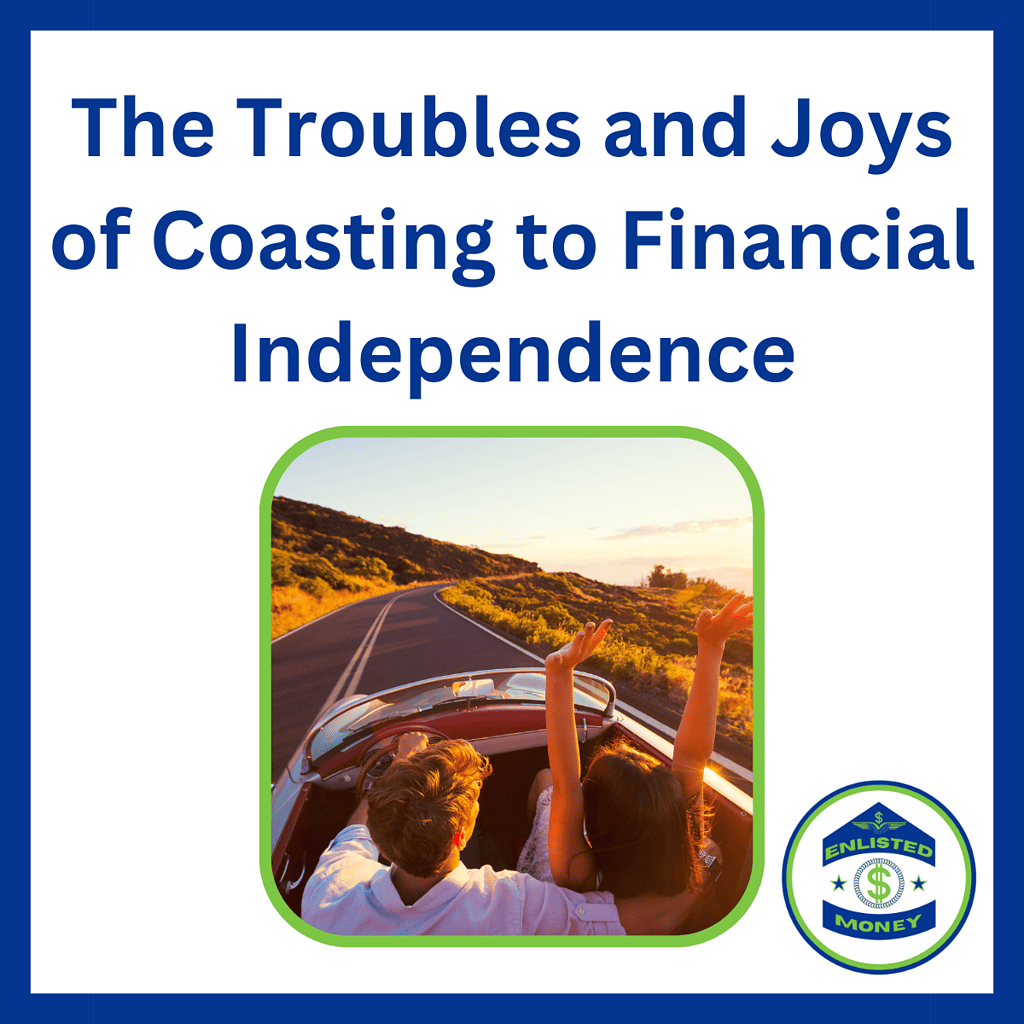
Financial independence, independently wealthy, retired, financial freedom, call it whatever you want, but the point is that you no longer need to work or create additional income to support your life. I hesitate to call it “coasting” because there’s still a lot to keep track of.
I feel like the saying from my time in service that “complacency kills” is probably equally, if not more, true for your financial life. It can be exhausting working to get out of debt, build up an emergency fund, dial in a budget, and hit all your savings goals. Once you tackle all those, you can feel like should be able to relax and not keep things in check. Not exactly.
When Can I Say I’m “Coasting” or Coast FI?
I define your entrance into the “Coast” stage of financial freedom as when you no longer have to add or change anything to reach financial independence. In other words, all you need to do is not f&#k up and you’ll hit your FI number. I think technically people consider you to be “Coast FI” when you no longer have to add any additional funds in order for you to achieve your FI number.
Example: If you have determined that you’ll need [insert your number here] to reach FI (you can live off your investments forever), and you’re on track to reach that with your current savings rate, you only need to maintain everything into the future. This is assuming you’ve covered all the basics, have proper insurance, aren’t being overly risky, and aren’t carrying a lot of debt. You need to keep investing and saving at your current rate for [insert your years to FI here] more years and you’ll reach financial independence.
Now What? I feel Like I Should Do Something
Here’s where you really need to shift to the pitfalls of financial independence people don’t talk about – mindset and money habits. I can tell you from experience, having more money in the bank will not automatically make you happy. As a matter of fact, we’ve found the opposite is sometimes true, but don’t let this discourage you. We’re working through that in our house, but years of money scripts and habits don’t change overnight.
Money Scripts and Habits
If you grew up without money, it’s very possible that once you have some money, you’ll be even more afraid of losing that money. You probably never want to go back to living paycheck to paycheck or have to swallow your pride and take a job you hate again (or stay in service longer). For me, I’m a natural spender and investor. I have a lot of money worship scripts that drive my emotions and behaviors around money.
What this means is that the more money I have the more money I spend. My idea of being frugal is relative to my income. I tend to justify overspending by looking at percentages compared to our net worth or income. Because I also (incorrectly) equate my ability to earn more money and build wealth to my own self-worth, these can fuel each other [in a bad way]. This has definitely created issues in the past.
Working With Your Partner
Luckily for me, my wife is a natural saver and has a lot of money avoidance scripts. These two very different personalities often clash, but they also tend to balance each other out. It’s taken us years to develop systems that work for both of us. For instance, I’ve had to train myself to ignore the checking account and only look at my personal spending account or the cash I have on hand. If I see it, I’ll spend it. We also need to keep some extra “buffer” money in the checking and other savings accounts to help my wife feel secure by seeing we have money in the account.
Seeing a zero balance or a large amount of cash affects each of us in wildly different ways. I see a zero balance and just go, “Well, I guess I need to make more money somehow.” My wife would react by stopping all spending on everything whether we need it or not.
Why Share All This?
Well, two main reasons:
1. I’m a real person and believe in being as transparent (and helpful) as possible.
2. These examples can help highlight the new challenges you’ll face. However, your challenges may be very different from ours.
If you are going to stay on course and achieve happiness, the real reason we’re doing all this financial stuff in the first place, you’ll have to wrestle with the mental and emotional bits at some point.
To me, the biggest threat to staying on course is going to be your ability to make sound decisions when issues come up. The stock market is going to crash at some point. You’re going to have emergencies pop up. You also might get an extra chunk of money fall into your lap at some point too.
How Do You “Fix” These Issues?
In short, I believe you don’t “fix” these issues. Once you solve all the “money stuff,” you’re the root of any additional problems. However, you are the way God made you (my own personal belief) and you need to work with what you’ve got. We’ve slowly changed things to suit our needs. We also go to counseling and therapy (Gasp! I know, lol) to work out differences and issues too. I wish we’d done more of that earlier on.
I feel you need to build systems and processes to work in concert with your unique personality and situation. You need to pick a system for budgeting and managing your money and try it out. If a system or method relies solely on your ability to resist temptation, it’s probably not going to be very successful. You can’t “will” your way to wealth. You still have to take ownership and responsibility for everything you do or don’t achieve, but you need to give yourself some grace too. We’re humans, not robots.
Getting Advice or Delegating
There’s also no harm or shame in delegating or getting outside advice for your financial life. Actually, I highly recommend it. Even if you just utilize a free financial counselor on post, it can be helpful. However, they’re not able to (legally) give you specific investment advice. For that, you’ll need to reach out to a registered investment advisor or financial planner. I highly recommend searching for someone whose primary compensation doesn’t come from selling you insurance and investment products.
I recommend a fee-only or advice-only advisor if possible. I’m a huge fan of the folks at the Military Financial Advisors Association (MFAA) and know many of them personally (because they helped me out). The XY Planning Network (XYPN), Advice Only Network, or Garrett Planning Network are also options, but not all will specifically cater to the military.
Although I’m not a practicing advisor, I have the same education as many practicing advisors you’ll run across. I love to help and answer questions whenever I can. Depending on where you’re physically located, I might even hop on the bike (motorcycle) and come over to help sort things out. As my time allows, I can also hop on a quick Zoom call or answer an email just as easily.
Key Takeaways
The road to financial freedom is absolutely worth it! However, it’s not all unicorns and rainbows like some people make it out to be. I believe that anything worth having is worth working for – your financial goals are no different.
It’s a Process, Not a Destination
Although we talk about achieving this seemingly mythical milestone of financial freedom and independence, there’s always something needing attention. As you continue to build wealth, you’ll have a greater ability to shift some of that responsibility to others by hiring wisely. However, you can do it yourself too.
Be cautious about taking any action when you’re emotionally charged. You want to get to a point where you trust your system and let it work for you. I’d also be cautious about anyone or anything that promises to always “beat the market” or is touting the thing “the millionaires/billionaires do.” If it sounds too good to be true, it definitely is. You might not realize it until the person who sold you on it moved on (with your money).
I wish you the absolute best of luck in the future! If you haven’t quite made it to the Coast phase, it’s okay. Take your time and check out some of our articles on getting started and automation. You can also submit your own Enlisted Money Confession to get my feedback on your situation. You might even get some free swag for submitting!
